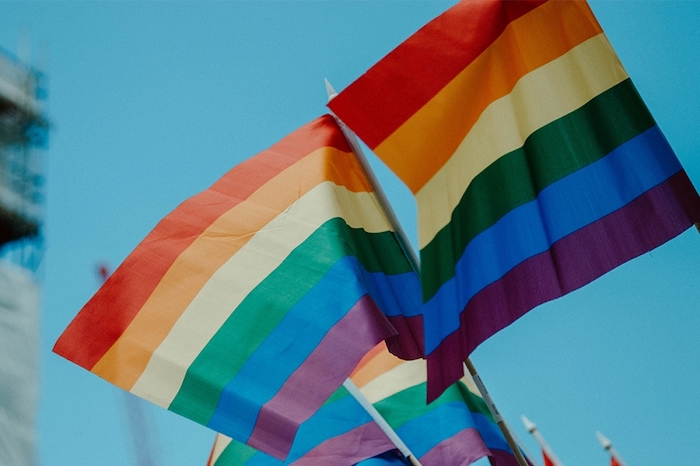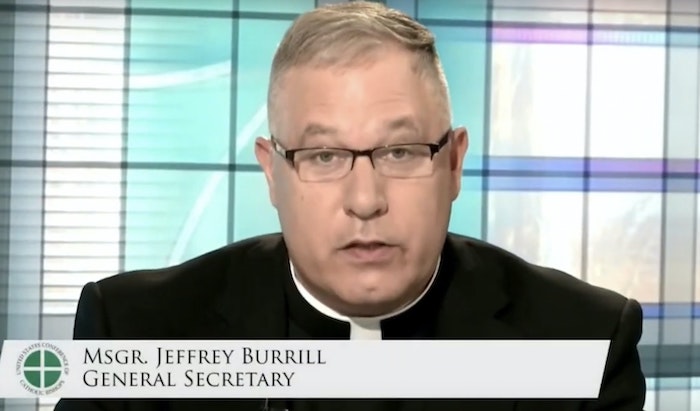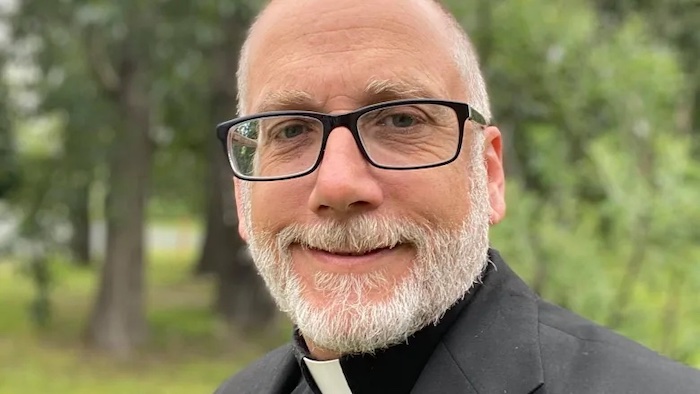
By Michelle Boorstein, Marisa Iati & Elahe Izadi
In January, when Ed Condon and JD Flynn broke off from their jobs at a long-standing Catholic news agency, they promised readers of their new newsletter that they would deliver reporting without an agenda, or a foregone conclusion. “We aim to do serious, responsible, sober journalism about the Church, from the Church and for the Church. . . . We want The Pillar to be a different kind of journalism.”
Six months later the Pillar broke the kind of story mainstream news organizations would be unlikely to touch: They said they had obtained commercially available data that included location history from the hookup app Grindr, and used it to track a high-ranking priest from his offices and family lake house to gay nightclubs.
Now Condon and Flynn, two 38-year-old canon lawyers-turned-muckrakers, are at the center of both a global surveillance-ethics story as well as a mud fight among their fellow Catholics over whether last week they served or disgraced the church. One Catholic writer described it as “a witch hunt aimed at gay Catholic priests.”
In some ways the Pillar story and reaction to it feels almost like a throwback: Conservative Catholics who point to the 1960s and liberalizing sexual mores for society’s troubles and focus on gay priests. But in 2021 the availability of personal digital data and the use of smartphones for surveillance are far bigger fears for the vast majority of Americans than is news about a member of the clergy possibly using a hookup app.
Flynn and Condon’s story also punctuates how America’s religious and journalistic landscapes have changed. Institutions and hierarchies now have to contend with scrappy start-ups taking matters into their own hands.
And in the growing conservative Catholic media scene, their newsletter and its takedown of Monsignor Jeffrey Burrill represents a new power and boldness of those demanding their church be purged of leaders who they see as too permissive on issues like abortion, gender norms and sex outside of heterosexual marriage.
On Friday, the pair answered the question of whether there would be more sex-data stories following the Tuesday announcement of Burrill’s resignation as chief administrator of the U.S. Conference of Catholic Bishops. The Pillar reported it had brought some of its findings from the data to the Archdiocese of Newark to say there were “patterns of location-based hookup apps” at various clerical residences there. In a statement to The Post, the archdiocese said the Pillar provided no actual data or evidence of misconduct and that the matter is being reviewed.
Flynn and Condon initially said they were not interested in participating in an interview for this article, then agreed to consider questions by email, and later said they didn’t have sufficient time and declined. But in comments they’ve tweeted since Tuesday and a podcast they posted Friday, they explained a bit of their thinking.
“There’s nothing to recommend the indiscriminate naming and shaming of people for moral failures just because you can. That is unethical. And that is not something I believe we’ve done,” Condon said on the podcast.
“People are entitled to moral failures and repentance and reconciliation and to a legitimate good reputation. There’s a difference between that and serial and consistent, immoral behavior on the part of a public figure charged with addressing public morality, isn’t there?” Flynn said.
Catholicism opposes sexual relations outside heterosexual marriage and teaches that homosexuality is disordered. Priests may be gay — and many are — but must be celibate, according to Catholic teaching.
They also compared their Burrill piece to one done by the New York Times’ Opinion section, which explored the dangers of leaked smartphone data and used such data to identify a person who was near the U.S. Capitol on Jan. 6. The New York Times piece quoted one man who was interviewed and agreed to his name being used.
One of the writers of the Times’ piece Friday said the whole point of the reporting was to expose the vulnerability of such data, and that they didn’t name anyone without consent.
“This was the nightmare scenario that we were talking about to some degree. . . . To see it happen is just confirmation of just how dangerous this type of information is,” said Charlie Warzel, who has since left the Times and now is also publishing on Substack, the same online newsletter platform the Pillar uses. “Despite the fact that I don’t think there are any ethical similarities with what we did and this, it obviously makes me feel terrible that our work was used as a justification in this.”
Condon and Flynn were willing to go where Catholic media in the past apparently have not.
Specifically, in 2018, when an anonymous tipster offered an explosive scoop to Alejandro Bermudez, executive editor of the Catholic News Agency, the Colorado-based outlet owned by EWTN, a multimillion dollar nonprofit Catholic media company.
The data hawker, who, Bermudez said, agreed to meet at a Denver coffee shop, claimed to have a trove of information showing priests using dating apps. The person came from a technology background but was interested in “reforming” the church and wanted the material that allegedly could expose priests’ double lives to be in Catholic hands, he told The Post.
Bermudez said he doesn’t recall the tipster’s name but that he was dubious about the data’s credibility and its news value, and he passed for those reasons.
Flynn and Condon were at CNA when Bermudez got that tip, but neither knew about it, Bermudez said. He also doesn’t know whether the data in the Pillar story is the same information once presented to him but said there are parallels.
Bermudez said CNA gets a few pitches each year from people who allege they can reveal priests’ indiscretions. But he said he would not have published the story about Burrill and was concerned about the other ways similar data could be weaponized within the church.
“Once this cat is out of the bag, what is the limit?” Bermudez said. “If we say, ‘Listen, that was completely legitimate, that was completely moral,’ then any kind of tracking by any authority in the Catholic Church is fair game.”
Now it appears similar information did end up in Catholic hands — just not those of a legacy Catholic media organization, instead in those of two men running an upstart newsletter who say their journalism is in the service of Jesus Christ. Some Catholics agree; others, even fellow conservative Catholic journalists, worry the pair also see themselves as a kind of prophet, judge, jury and executioner.
Flynn grew up in a Protestant family in New Jersey and converted to Catholicism. He worked for the Archdiocese of Denver from 2007 to 2013 under leading conservative Archbishop Charles Chaput. Flynn was chancellor there for the last two of those years. He was also spokesman for the diocese of Lincoln, Neb., the lone holdout in the American Catholic Church where girls may not be altar servers. He is a canon lawyer, an expert on church laws, such as those guiding Catholic annulments or disputes.
Condon, nephew of Catholic University President John Garvey, grew up in New Jersey and England, and worked in British politics for years before serving as a canon lawyer in U.S. dioceses.
At the Catholic News Agency, the pair quickly stood out for being the rare right-leaning Catholic journalists aimed squarely at the hierarchy and holding it accountable. Both regularly sprinkle their tweets with references to church law and confidently — some say cockily — tout their own interpretations as the most pure and accurate.
They also draw readers with their personal tweets, more casual than Vatican-stuffy, with Flynn as the wholesome dad of three sharing photos of his family and preaching about traditional values, while Condon plays the cynical grump who pines for the old days when men wore suits and elegant watches.
Flynn was interviewed for a 2018 master’s project at the University of Missouri about ethics in Catholic journalism.
In that paper, he said he thought all journalists are the same in that they all have a “guiding set of assumptions. . . . The concept of objective journalism is a myth.”
However, the paper described Flynn as saying that Catholic journalism has a different set of ends in mind than simply to inform and educate. The difference, he argued, is that “the Catholic perception of the common good is, ultimately, the salvation of souls, and more generally the Church’s ideas, developed over the centuries, about what constitutes human flourishing.”
Flynn and Condon resigned from CNA late last year to launch the Pillar, mirroring a broader media narrative in which journalists have left established media companies to strike out on their own. The publishing platform allows them editorial freedom, but not always a guaranteed paycheck: Writers can collect subscription money from newsletters, with Substack taking a 10 percent cut. Some writers get an advance.
As of last week, the Pillar ranked as the third-highest-grossing Substack in the “faith” category, and it has thousands of subscribers.
“The trends in Catholic media are not that different from secular media,” said the Rev. Matt Malone, editor in chief of America, a Jesuit magazine. Some writers are going independent with Substacks while legacy outlets, he said, are trying to “amass this sizable digital audience and to navigate editorially in a polarized world.”
But while competition among secular media for eyeballs and clicks is about financial survival, for Catholic media, there’s another underlying struggle: for the right to say who is on the side of God and the true church.
There are left-leaning sites that focus on social justice aspects of church teachings such as the rights and needs of the poor and immigrants, while others focus heavily on teachings around abortion and sexual orientation.
Kathryn Jean Lopez, a Catholic writer who works for the conservative National Review, said last week she was torn about the ethics of the Pillar’s methods. However, she said she understood the men’s motivation.
Lopez said the Pillar is a product of “this frustration that men aren’t living the lives they stepped up to live” — namely priests who violate their promises to be chaste, and concerns that teachings about things like contraception and homosexuality are being ignored.
“They’re concerned about the rot in the church. There’s clearly been a nodding and winking and looking away. The church is not immune from the fallout of the sexual revolution — that’s gotten as extreme as putting children on puberty blockers,” she said. “Someone has to clean up the church for the sake of the world. . . . I think this is why the Pillar exists.”
>Condon and Flynn were vague about why they left CNA.
In their podcast episode Friday, they said a source approached them a few months ago with a broad data set that supposedly let them link dating-app use to priests’ phones. The data did not contain names and phone numbers but did have the phones’ unique identifying numbers and information about their locations. Using additional information, like the priest’s known locations and travel, it was possible to identify who some of the data belonged to, the writers said.
Flynn and Condon said they verified the data’s legitimacy but did not say how or with whom. They said the data had been bought legally but didn’t say whether they paid for it.
They argued that Burrill was a legitimate target because he was a CEO-like figure at the U.S. Conference of Catholic Bishops, which develops policies such as those protecting children from sexual abuse. Getting pushback for linking being gay and child abuse, the men said they were calling out Grindr itself as dangerous for children, not gay people. In its original story on Burrill, the Pillar wrote, “There is no evidence to suggest that Burrill was in contact with minors through his use of Grindr.”
Michael Brendan Dougherty, a senior writer at the National Review, said he has been impressed by the outlet’s reporting on Vatican finances.
“(The church) doesn’t need more volunteer interpreters of the pope’s ‘true intentions’ or whatever it is other outlets speculate about. It needs journalism about corruption, management and policy. That’s what the Pillar does,” Dougherty said.
But media ethics watchers were unnerved by their tactics, even if the data was legally obtained.
“I worry very much about creating — through some of these precedents — a permissibility of journalists to basically publish whatever they can get their hands on,” said Edward Wasserman, media ethics professor and dean emeritus of University of California at Berkeley’s Graduate School of Journalism.
Many other prominent Catholics were similarly disturbed by the Pillar’s methods
Michael O’Loughlin, a national correspondent for America magazine, called it “a witch hunt aimed at gay Catholic priests” on Twitter.
Monsignor Richard Antall, a pastor in Cleveland and author, wrote in a Catholic digital magazine focused on the L.A. area that the Pillar’s story took an “inquisitorial approach.” David Scott, the spokesman for the USCCB President Archbishop Jose Gomez, shared Antall’s essay in a tweet:
“Serious ethical questions about this ‘investigation.’ Must reading,” Scott tweeted.
Toward the end of Friday’s podcast, Flynn and Condon bemoaned the public debate about their recent work.
“I hate being the center of attention like this,” Flynn said
Complete Article ↪HERE↩!







